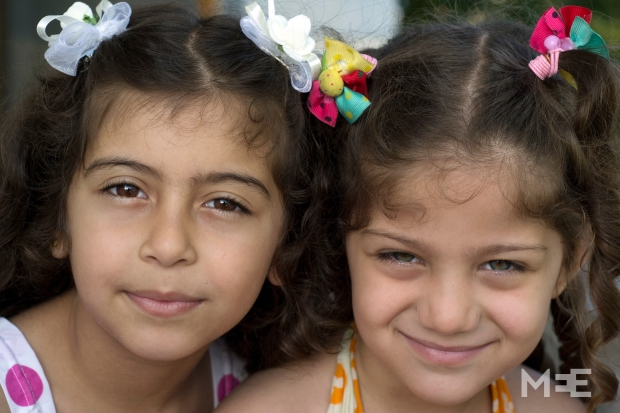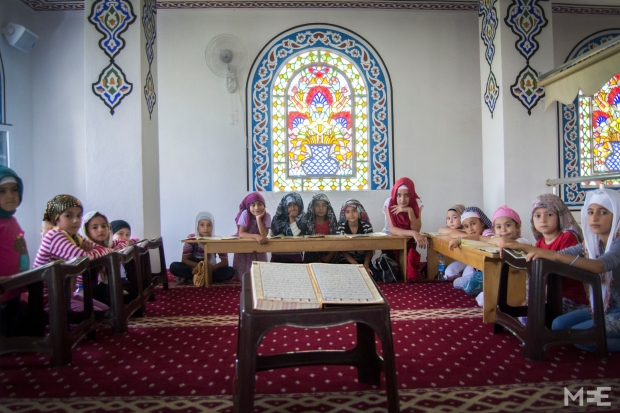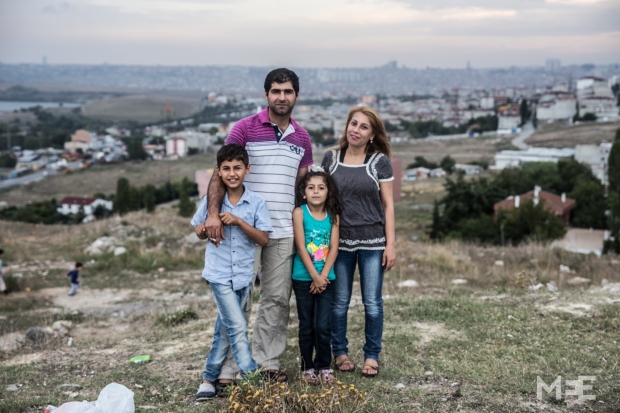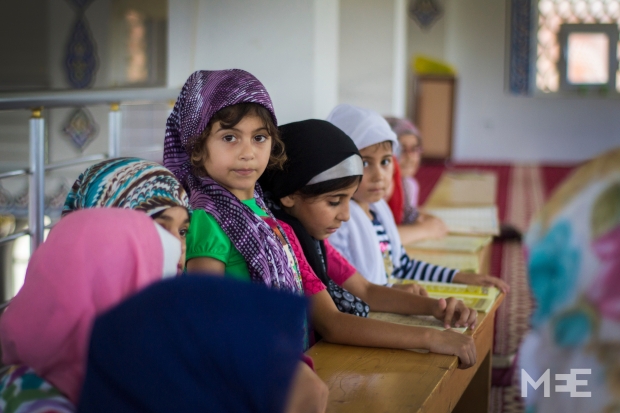A million invisible Syrian refugees: ‘Mother, it’s OK, we are not dead’
#SyriaWar
Take a look at the daily life of two families from Aleppo, whose anger level is slowly rising. Will their emotions make them tomorrow’s enemies?

The Nasro family lives in the popular neighbourhood of Sahintepe, in the west of Istanbul (MEE/Xander Stockmans)
The city is expanding and apartment buildings and mosques are gobbling up space. Many Syrian refugees live alongside poor Turks on the hillside west of old Istanbul. I spent one week with the families Nasro and Ibesh. Both have fled Aleppo, both are refugees in the working-class quarters of Istanbul.
The siege
Roshin used to be a cleaning lady in Aleppo. “I had to pass through dozens of checkpoints on my way to work,” she says. “Once I saw a woman collapse in front of me. Snipers had shot her in the leg.” For one year, her friend Nacah lived in her basement after rubble had landed in her five-year-old daughter, Jin’s room. Her husband, Imad Ibesh, used to distribute food in the besieged neighbourhoods. Jin only saw her father when he brought leftovers down to the basement. She heard the adults talk about the dead, the wounded, torn off limbs and weapons. “In the dark I would teach her Kurdish freedom songs,” Nacah says. “Today she knows them word by word.”
 Rojda Nasro and Jin Ibesh (MEE/Xander Stockmans)
Rojda Nasro and Jin Ibesh (MEE/Xander Stockmans)
A sinister thunder, the sound of buildings collapsing. On 27 March, 2013, they were chased out of the basement like rats. They saw thousands of people in the dusty streets, running, screaming. An apocalyptical scene. “In five minutes time, a neighbourhood with tens of thousands of inhabitants was empty,” Nacah says. “Jin was laughing and crying at the same time. ‘Mother, it’s ok, we are not dead,’ she said.”
Roshin had to flee as well. She and her husband, Mohamed Nasro had spent years working to buy the house that was about to be destroyed. “It was night. I was wearing my pajamas. When I saw the planes flying over our neighbourhood, I was frightened,” she recounts. She put on her headscarf and started to pray for her life. They could reach the town of Kurdan, but their savings ran out quickly, so they moved on to Istanbul.
Imad Ibesh wanted to return to Aleppo to distribute food. Jin saw her father disappear again. “My family said that I should divorce him, but I didn’t want to,” Nacah says. “When I got pregnant with our second child, he agreed to go to Istanbul.” Imad remained loyal to activism. He and his brother worked as political analysts for a Kurdish radio station in Istanbul. Together they earn 1000 euros a month, an income that should feed six people.
Roshin had to flee as well. She and her husband, Mohamed Nasro had spent years working to buy the house that was about to be destroyed. “It was night. I was wearing my pajamas. When I saw the planes flying over our neighbourhood, I was frightened,” she recounts. She put on her headscarf and started to pray for her life. They could reach the town of Kurdan, but their savings ran out quickly, so they moved on to Istanbul.
Imad Ibesh wanted to return to Aleppo to distribute food. Jin saw her father disappear again. “My family said that I should divorce him, but I didn’t want to,” Nacah says. “When I got pregnant with our second child, he agreed to go to Istanbul.” Imad remained loyal to activism. He and his brother worked as political analysts for a Kurdish radio station in Istanbul. Together they earn 1000 euros a month, an income that should feed six people.
 The Turkish mosque where Syrian refugee children go during holidays to practice reading (MEE/Xander Stockmans)
The new life
The Turkish mosque where Syrian refugee children go during holidays to practice reading (MEE/Xander Stockmans)
The new life
 The Turkish mosque where Syrian refugee children go during holidays to practice reading (MEE/Xander Stockmans)
The Turkish mosque where Syrian refugee children go during holidays to practice reading (MEE/Xander Stockmans)
Jewan Nasro, 11, is running through the streets of working-class neighbourhood, Sahintepe, with Syrian and Turkish children. Chickens, goats and cows are walking on the grass down the road. People from the neighbourhood bring their waste to a public dumpster, where it burns up and toxic fumes evaporate. On the horizon, office buildings arise and cars rush along the beltway like little ants. 7-year-old Rojda Nasro is sitting next to her mother in the living room, playing games on a cell phone.
In Aleppo, Jewan and Rojda went through hell, but here they radiate with energy. It took a while to get their lives back on track. “My brothers had left for Germany with smugglers, but I had to make Jewan and Rojda work,” their father, Mohamed says bitterly. After a day of work in the sewing studio, in the basement of the apartment, he plops down on the couch. Luckily, Roshin’s cousin in Belgium could transfer some money to stop the children from joining the army of illiterates. Roshin herself could work in a supermarket, earning 7 euros a day.
In Aleppo, Jewan and Rojda went through hell, but here they radiate with energy. It took a while to get their lives back on track. “My brothers had left for Germany with smugglers, but I had to make Jewan and Rojda work,” their father, Mohamed says bitterly. After a day of work in the sewing studio, in the basement of the apartment, he plops down on the couch. Luckily, Roshin’s cousin in Belgium could transfer some money to stop the children from joining the army of illiterates. Roshin herself could work in a supermarket, earning 7 euros a day.
Back to school
Rojda is an enthusiastic student in the Syria Can Schools. She gets a nine or a ten-out-of-ten for all of her subjects. “One seven-out-of-ten was enough to get a grumpy face in all of her graduation pictures,” Roshin laughs. “With the right support, this child will have a bright future,” the principle wrote on Rojda’s report card. Many children of Syrian refugees have no passport and cannot enroll in Turkish schools, because they are “illegal”. Since 2012, the Can Schools have been organising classes for 1500 students in Istanbul.
Roshin wants to provide this support for her children no matter what. She tries to make sure they do not get behind in school. “When we left Aleppo, Rojda was not going to school yet and Jewan could barely read and write,” she says. “That is why I send them to a Turkish mosque during the summer vacation. There they learn how to read, for free, by reading the Quran.” Jewan kisses the Quran and starts reading with a hoarse voice. He stutters, but is proud of everything he has learned at the mosque.
 The Nasro family from Aleppo (left to right: Jewan, Mohamed, Rojda, Roshin) with the city of Istanbul in the background (MEE/Willemjan Vandenplas)
A born leader
The Nasro family from Aleppo (left to right: Jewan, Mohamed, Rojda, Roshin) with the city of Istanbul in the background (MEE/Willemjan Vandenplas)
A born leader
 The Nasro family from Aleppo (left to right: Jewan, Mohamed, Rojda, Roshin) with the city of Istanbul in the background (MEE/Willemjan Vandenplas)
The Nasro family from Aleppo (left to right: Jewan, Mohamed, Rojda, Roshin) with the city of Istanbul in the background (MEE/Willemjan Vandenplas)
Rojda is only seven years old and has recently started to learn how to read, yet she already knows words such as “sniper”, “Free Syrian Army” and the names of different kinds of weapons. Proudly she begins to explain: “Once I was walking with mom and Jewan when I heard a bullet from a sniper barely missing Jewan. I also found a bullet on our balcony once and when I picked it up, it was still warm.”
We visit the Turkish mosque. The boys are sitting on the carpet downstairs. Upstairs is where the girls are, wearing their headscarves. Every child has a copy of the Quran. One-third of these children is originally from Syria. Rojda, a born leader, clearly has a hard time not being able to use her leadership capacities around the Turkish children who do not understand her. Later on she tells us that they bully her. “If I become the president, I will allow Europeans to come to Syria, but not the Turks,” she says. “But I will become an engineer so that I can rebuild our house.”
We visit the Turkish mosque. The boys are sitting on the carpet downstairs. Upstairs is where the girls are, wearing their headscarves. Every child has a copy of the Quran. One-third of these children is originally from Syria. Rojda, a born leader, clearly has a hard time not being able to use her leadership capacities around the Turkish children who do not understand her. Later on she tells us that they bully her. “If I become the president, I will allow Europeans to come to Syria, but not the Turks,” she says. “But I will become an engineer so that I can rebuild our house.”
Emotional bombs
The war has destroyed more than just buildings. The bombs that were dropped on Aleppo have unchained an emotional bomb that is making its way towards the family. Mohamed cannot accept the fact that Syria has irreversibly changed. His heart is deeply connected with the olive trees, the fruit, the goats and the air in the countryside. Every morning, when he does not see the sun rise over the hills of Kurdan but over megalopolis Istanbul, he thinks about Europe: a nightmare. But his village is no longer a dream. Today there is no electricity, nor a school. And education is the electricity that alights Rojda.
That night the apartment in Istanbul is filled with guests from Kurdan. The power outage reminds them of their life in Kurdan. Jewan brings out the candles and Rojda sings “Happy Birthday”. Everyone laughs. The men discuss world politics while the women tell each other secrets over candlelight.
That night the apartment in Istanbul is filled with guests from Kurdan. The power outage reminds them of their life in Kurdan. Jewan brings out the candles and Rojda sings “Happy Birthday”. Everyone laughs. The men discuss world politics while the women tell each other secrets over candlelight.
Roshin knows that only in Europe can her children become the person she never became. She gets teary-eyed when talking about how she dropped out of school: “To go to school, I had to move from Kurdan to Aleppo when I was six, but I cried myself to sleep every night, because I missed the village. When I was twelve, I dropped out of school and returned to the village.”
History is about to repeat itself: Jewan and Rojda have come to the city – Istanbul – to go to school, but this time it’s Mohamed’s detachment that might bring them back to the village. “I would even go to Europe alone with the kids,” Roshin whispers under a full moon.
History is about to repeat itself: Jewan and Rojda have come to the city – Istanbul – to go to school, but this time it’s Mohamed’s detachment that might bring them back to the village. “I would even go to Europe alone with the kids,” Roshin whispers under a full moon.
“If Roshin does that, then I will join a militia. I can’t accept my children becoming children of Europe instead of Syria,” Mohamed explains when we talk to him separately. Rojda and Jewan are trapped in between their parents’ conflicting visions of their future.
Imad and Nacah are also growing apart. Nacah often reminisces about the past. Imad’s brother and mother are living in the family’s small apartment and there is no room for privacy. Jin however, did find the space for quiet in her head. “When we got to Turkey, Jin directed a barrage of questions at me: who destroyed our streets? She was furious. Ever since that day she has been behaving aggressively towards other children,” Nacah says. Jin is running around in the apartment, screaming, laughing, beating her mother and sulking.
Imad and Nacah are also growing apart. Nacah often reminisces about the past. Imad’s brother and mother are living in the family’s small apartment and there is no room for privacy. Jin however, did find the space for quiet in her head. “When we got to Turkey, Jin directed a barrage of questions at me: who destroyed our streets? She was furious. Ever since that day she has been behaving aggressively towards other children,” Nacah says. Jin is running around in the apartment, screaming, laughing, beating her mother and sulking.
 Rojda Nasro in the Turkish mosque (MEE/Xander Stockmans)
‘As if we do not exist’
Rojda Nasro in the Turkish mosque (MEE/Xander Stockmans)
‘As if we do not exist’
 Rojda Nasro in the Turkish mosque (MEE/Xander Stockmans)
Rojda Nasro in the Turkish mosque (MEE/Xander Stockmans)
In Aleppo’s basement they discovered that Jin needs throat surgery. But it was impossible to reach the hospital because of the snipers. In Istanbul, she cannot get the surgery either, because they have no passport, no official job and no social security. The surgery costs 1000 euros, which is unaffordable. Every time Jin coughs, Nacah and Imad are confronted with this reality. “Give us our basic rights and we will build up a life here. Then, the migration flows towards Europe would stop. But the world prefers to close its eyes as if we do not exist,” Imad says.
While a crying journalist on television talks about the horror in Iraq, a cheerful Jin walks into the living room. “I baked you a cake from here to God,” she shouts. The call for prayer sounds. It is 3 am., and Jin does not look tired at all. Only when we tell her we will to go to the park tomorrow, she accepts to go to bed.
A family in the park. It is a big thing here; children, parents and grandparents escape from their existence as eternal migrants looking for happiness. Jin and Rojda immediately attack the cookies and soda and engage in their colouring books. The girls’ shouting has given Jewan a headache, so he goes to bed immediately when we get home. The girls continue their drawing, the women start cooking, the men discuss politics. The smell of food fills the rooms. At the end of a beautiful day both couples sit together to make some decisions.
While a crying journalist on television talks about the horror in Iraq, a cheerful Jin walks into the living room. “I baked you a cake from here to God,” she shouts. The call for prayer sounds. It is 3 am., and Jin does not look tired at all. Only when we tell her we will to go to the park tomorrow, she accepts to go to bed.
A family in the park. It is a big thing here; children, parents and grandparents escape from their existence as eternal migrants looking for happiness. Jin and Rojda immediately attack the cookies and soda and engage in their colouring books. The girls’ shouting has given Jewan a headache, so he goes to bed immediately when we get home. The girls continue their drawing, the women start cooking, the men discuss politics. The smell of food fills the rooms. At the end of a beautiful day both couples sit together to make some decisions.
- “How long will you survive if I go ahead to Europe?” Imad asks Nacah.
- “As long as I know something better awaits us, I will even live out on the streets,” Nacah replies.
- “I’ve been telling Jewan that we will go to our cousin in Belgium for a year now. There is no war there, there are schools there. I’m afraid he no longer trusts me,” Roshin says.
- “First, I want to make sure that life in our village is no longer possible,” Mohamed states.
- “Don’t you know there are no schools left? If you’d sell your olive trees we could afford to pay a smuggler. Then you wouldn’t have to work 12 hours a day for a pittance.”
Mohamed has to sell the soul of the land – olive trees – to save his and the souls of his children. He is one step up the social ladder compared to other families whose only option is child labour. Mohamed is not forced to make this inhuman choice yet. He has resources. The women already understood which sacrifices they will have to make if they want to start a new life. Their determination is stronger. They do not linger or come up with new excuses every day to procrastinate the inevitable. The women think about their children’s future, the men about their country’s future. “We will get a divorce if you continue like this,” the women laugh cynically.
- “As long as I know something better awaits us, I will even live out on the streets,” Nacah replies.
- “I’ve been telling Jewan that we will go to our cousin in Belgium for a year now. There is no war there, there are schools there. I’m afraid he no longer trusts me,” Roshin says.
- “First, I want to make sure that life in our village is no longer possible,” Mohamed states.
- “Don’t you know there are no schools left? If you’d sell your olive trees we could afford to pay a smuggler. Then you wouldn’t have to work 12 hours a day for a pittance.”
Mohamed has to sell the soul of the land – olive trees – to save his and the souls of his children. He is one step up the social ladder compared to other families whose only option is child labour. Mohamed is not forced to make this inhuman choice yet. He has resources. The women already understood which sacrifices they will have to make if they want to start a new life. Their determination is stronger. They do not linger or come up with new excuses every day to procrastinate the inevitable. The women think about their children’s future, the men about their country’s future. “We will get a divorce if you continue like this,” the women laugh cynically.
“Mohamed, you’ve been working like a slave for years and our family still does not have stability,” Roshin says. “We have to take a different path. In Belgium you will be miserable, but also happy when Jewan and Roshda learn their first words in Dutch. My cousin’s brother and sister started their first year in school in Belgium. What plans do you have for our children?” A deep sigh. Roshin prefers to fight and lose, rather than not fight and lose. They are standing on a crossroad where stress and hurt deepen the wounds. Every day waited is a day lost for the children.
“I’m going,” Nacah decides all of a sudden. “I know someone who can lend us the money.” They go to bed with a fake feeling of relief because at least one decision was made. The conversations are still resonating in the hallways of the apartment, the aimless running around, the worried looks as foreboders of radical change. The next day the dream is gone: lending money turns out to be impossible. On Facebook, Imad posts pictures of Nacah and Jin in a bus. Back to Syria.
Follow Pieter Stockmans @VRIJHEIDenGELUK
“I’m going,” Nacah decides all of a sudden. “I know someone who can lend us the money.” They go to bed with a fake feeling of relief because at least one decision was made. The conversations are still resonating in the hallways of the apartment, the aimless running around, the worried looks as foreboders of radical change. The next day the dream is gone: lending money turns out to be impossible. On Facebook, Imad posts pictures of Nacah and Jin in a bus. Back to Syria.
Follow Pieter Stockmans @VRIJHEIDenGELUK
Roni Hossein contributed reporting for this story.
- See more at: http://www.middleeasteye.net/in-depth/features/million-invisible-syrian-refugees-mother-it-s-ok-we-are-not-dead-904121883#sthash.OiqHFbsH.dpuf
No comments:
Post a Comment